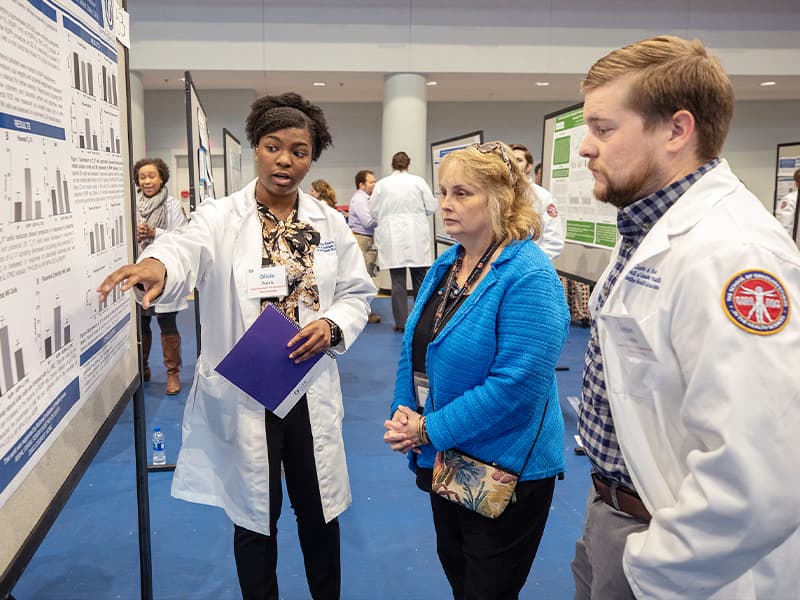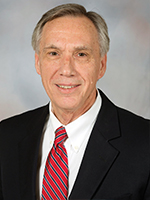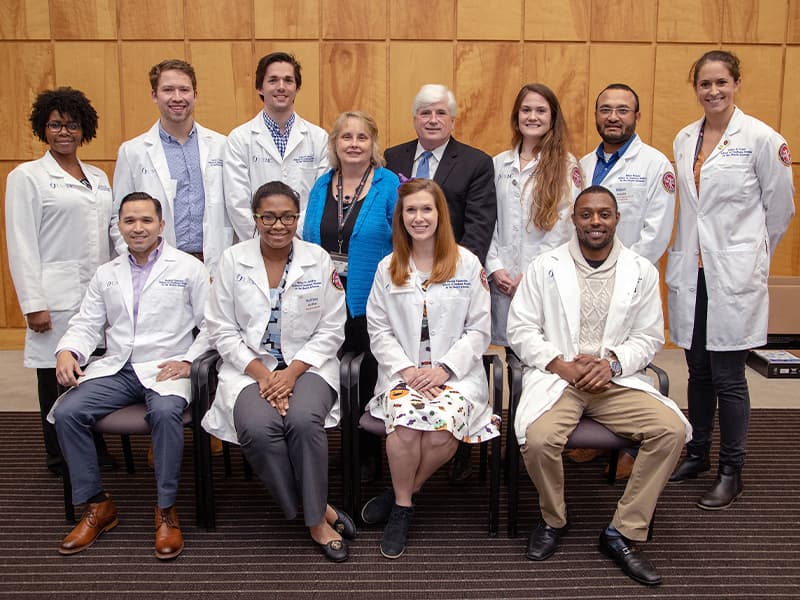Distinguished alumna recounts mentors' roles at SGSHS Research Day

Dr. Barbara Alexander says “It takes a village to raise a scientist,” and she certainly has found her village at the University of Mississippi Medical Center.
Alexander, a professor of physiology and biophysics, is the School of Graduate Studies in the Health Sciences’ 2019 Distinguished Alumna.
Alexander, who graduated with a Ph.D. in biochemistry in 1997, knew that she wanted to be a scientist since high school, thanks to a “demanding” teacher at Starkville High School, Jane Lusk. If you liked Mrs. Lusk, and few students did, you were likely to end up really liking science, Alexander said.
“I was one of the few who liked her,” Alexander told trainees at the SGSHS’s annual Research Day luncheon October 31 in the Norman C. Nelson Student Union.
Alexander, whose parents both taught at Mississippi State University, had her first job at the University working in a zoology laboratory, washing glass test tubes and rat cages. After graduating with a B.S. in zoology a few years later, she started work as a research assistant in the Department of Biochemistry at UMMC. She paused her plans to complete a Ph.D. in order to care for her children.
But one of her mentors at Mississippi State, Dr. Jan Chambers, made sure Alexander kept looking towards the future, asking her, “When are you going to go back?”
“She always encouraged me to not lose sight of my long term goals,” Alexander said. “I spent so many years working in laboratories that I already had a good grasp of what it would take to be successful.”

By the time Alexander decided to start her Ph.D. studies, her children were in elementary and middle school, and they were not interested in moving. So, they stayed in the biochemistry department in Jackson, where she studied histone biology under the mentorship of Dr. Donald Sittman, professor emeritus, and Dr. David Brown, then a postdoctoral fellow and now a professor of cell and molecular biology at UMMC.
“Dr. Sittman would tell us that your graduate school years should be your most productive ever,” Alexander said.
When Alexander joined the Department of Physiology and Biophysics for as a postdoctoral fellow in Dr. Joey Granger’s lab, he suggested that they could learn new skills from each other.
“He said, ‘I can teach you about the kidneys, and you can teach me molecular biology’,” Alexander said.
One of the greatest gifts she received as a postdoc, she said, was the opportunity to write a single-author paper based on research funded by her mentor’s grant. In that research, she showed that restricted blood flow to the placenta in pregnant rats led their offspring to be both low birth weight and predisposed to developing high blood pressure.
This work formed the basis for her eventual research focus as a faculty member, understanding how a mother’s health during pregnancy can set the stage for their children’s health after birth.
“Developmental programming was a new field when she started this line of research,” said Granger, who serves as dean of the SGSHS. “Dr. Alexander has made outstanding contributions to this field, and we are proud to call her one of our own.”
Alexander, who received the Medical Center’s platinum award for extramural research funding in 2015, is one of the main contributors to UMMC’s stature as a top institution for women’s health research. She noted that UMMC leads the nation in National Institutes of Health funding for research related to preeclampsia, a disease during pregnancy that includes maternal hypertension.
In 2018, Alexander received the Harriet Dustan award from the American Heart Association, which recognizes female scientists who have made outstanding contributions in the field of hypertension.
Alexander is the basic science director the Mississippi Center for Excellence in Perinatal Research, an NIH-funded programs to understand the diseases that affect women and their offspring during and shortly after pregnancy.
The grant’s leaders, all women faculty, regularly meet to work on future research proposals and refine their ideas, Alexander said. It’s a form of mentorship, one of Alexander’s favorite parts of being a researcher.
“You’re never too old or too experienced to be mentored,” Alexander said. “Always be willing to accept advice.”
The keys to being a good mentor are perseverance and patience, especially knowing when to step back and let trainees do their own projects and make decisions. Alexander recalled one mentee who came to her with a pen and paper, working through a pros and cons list for different postdoctoral fellowship options. When the list was done, they turned to Alexander and asked, “So, what do I do?” Alexander simply said it wasn’t her career, it was theirs.

“Dr. Alexander is an exemplary role model for young scientists, especially young women who seek to become highly accomplished scientist-educators in an academic setting,” said Dr. John Hall, Arthur C. Guyton Professor and Chair of Physiology and Biophysics.
“I would not be where I am today without the trainees and young people that I have worked with,” Alexander said.
Alexander shared her pearls of wisdom with graduate students and postdoctoral fellows. The key to being a good scientist isn’t necessarily brilliance, but rather “hard work and perseverance,” Alexander said.
She also noted a measure of good luck. If you had asked her 20 year ago if she thought she would spend her whole career at UMMC, she would have said no. However, starting her career at an institution with a big village of mentors, a department chair who is a “champion” for scientists and strong research programs made the Medical Center the best place to be.
Academic science is hard work but very rewarding, she told the students, encouraging them to keep their “passion for science.”
“I know people who have retired from science because the good was out of sight,” Alexander said. “For me, the bad is under the table and the good is still up high.”
And while she plans to spend more time with her growing grandchildren, Alexander does not plan to leave science behind.
“I feel like I haven’t even reached my peak yet,” she said.
Research Awards
The Distinguished Alumni lecture series is held in conjunction with the SGSHS’s Research Day. This annual event highlights the research conducted by the school’s Ph.D. students, postdoctoral fellows and instructors. It provides these early-career scientists with an opportunity to share their work through oral and poster presentations.
At the end of the event, the following individuals received awards for their presentations:
Graduate Students
Laura Coats, Physiology and Biophysics
Jacob Crouch, Nursing
Ezekiel Gonzalez-Fernandez, Experimental Therapeutics and Pharmacology
Ashley Griffin, Neuroscience
Owen Herrock, Experimental Therapeutics and Pharmacology
John Aaron Howell, Neuroscience
Alexandra Huffman, Cell and Molecular Biology
Tyler Lomax, Physiology and Biophysics
Kyle Moore, Physiology and Biophysics
Stacee Naylor, Nursing
Bibek Poudel, Experimental Therapeutics and Pharmacology
Hannah Turbeville, Experimental Therapeutics and Pharmacology

Postdoctoral Fellows
Dr. Lais Berro, Psychiatry and Human Behavior
Dr. Jeremy Duncan, Physiology and Biophysics
Dr. Xiaochen He, Pharmacology and Toxicology
Dr. Alan Mouton, Physiology and Biophysics
Dr. Yunxi Zhang, Data Science



